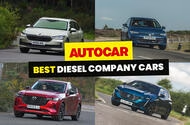Why Are Diesel Company Cars Still Worth Considering?
If you’ve been around the corporate car park in the last decade, you probably remember when diesel company cars were everywhere. They were the go-to for fleet managers and drivers alike, thanks to their impressive fuel efficiency and low CO2 emissions. But times have changed. With the diesel emissions scandal making headlines and governments pushing for an all-electric future, diesel’s reputation took a serious hit.
So, why are we still talking about diesel company cars in 2024? The answer is simple: for some drivers, especially those racking up motorway miles, diesel still makes a lot of sense. Let’s face it—if you’re regularly driving long distances, the comfort of a 500-mile range on a single tank is hard to beat. And while electric cars are catching up fast, diesel engines still deliver that satisfying mid-range torque that makes overtaking a breeze.
Are Diesel Cars Really That Efficient for Business Drivers?
It’s not just nostalgia keeping diesel alive in the company car world. The numbers still stack up for many businesses. According to the UK Department for Transport, modern diesel engines can achieve up to 60 miles per gallon on the motorway, outperforming many petrol and even some hybrid alternatives. That’s real savings for both the company and the driver, especially when fuel costs are on everyone’s mind.
Plus, diesel engines tend to last longer and require less frequent maintenance for high-mileage drivers. If your job involves lots of time behind the wheel—think sales reps, regional managers, or field engineers—a diesel car can still be the most practical and cost-effective choice.
What About Tax and Environmental Concerns?
Now, let’s address the elephant in the room: taxes and environmental impact. It’s true that Benefit-in-Kind (BIK) rates for diesel cars have crept up, and there are extra surcharges for models that don’t meet the latest emissions standards. But not all diesels are created equal. Many of the latest models meet strict Euro 6d emissions regulations, which means they’re cleaner than older versions and sometimes even rival petrol cars for NOx and particulate emissions.
If you’re considering a diesel company car, it pays to check the exact emissions rating and BIK band. Some manufacturers have worked hard to clean up their act, and you might be surprised at how competitive the latest models are—both for your wallet and the environment.
Which Diesel Company Cars Still Stand Out?
You might have noticed that diesel options are getting harder to find on manufacturer price lists. The shift to electrification is real, and many brands are scaling back their diesel offerings. But if you look closely, there are still some gems out there.
For example, the BMW 3 Series 320d remains a favorite among business drivers for its blend of performance, comfort, and efficiency. The Mercedes-Benz E220d is another strong contender, offering luxury and long-distance capability in equal measure. And let’s not forget the Volkswagen Passat, which continues to deliver rock-solid reliability and low running costs.
Fleet managers are also keeping an eye on models like the Peugeot 508 BlueHDi and the Skoda Superb TDI, both of which offer impressive fuel economy and spacious interiors—ideal for those who treat their car as a mobile office.
How Do Diesel Cars Compare to Electric and Hybrid Alternatives?
It’s impossible to ignore the rise of electric and hybrid company cars. They’re cleaner, often cheaper to tax, and increasingly practical as charging infrastructure improves. But for now, diesel still has the edge when it comes to sheer range and refueling speed. If your work takes you to remote areas or you’re regularly driving hundreds of miles in a day, diesel remains tough to beat.
That said, the gap is closing. According to a 2023 report from the International Energy Agency, electric vehicle range is increasing by about 10% per year, and charging networks are expanding rapidly. For many drivers, the switch to electric will make sense soon—if it doesn’t already.
What Should You Consider Before Choosing a Diesel Company Car?
If you’re weighing up your next company car, here are a few things to keep in mind:
– Your typical mileage: High-mileage drivers get the most benefit from diesel.
– Access to clean models: Look for Euro 6d-compliant engines to minimize tax and environmental impact.
– Company car tax: Calculate the total cost, including BIK and any surcharges.
– Future-proofing: Consider how long you’ll keep the car and whether diesel will still be the best fit in a few years.
The Bottom Line for Company Car Drivers
Diesel company cars may no longer rule the roads, but they’re far from extinct. For drivers who cover serious distances and need a reliable, efficient workhorse, diesel still has a place—at least for now. The landscape is changing fast, though, so it’s worth keeping an eye on new electric and hybrid options as they become more viable.
Ultimately, the best choice is the one that fits your driving habits, your company’s needs, and your own priorities. Diesel isn’t dead yet, but it’s wise to think ahead and stay flexible as the world of company cars continues to evolve.

